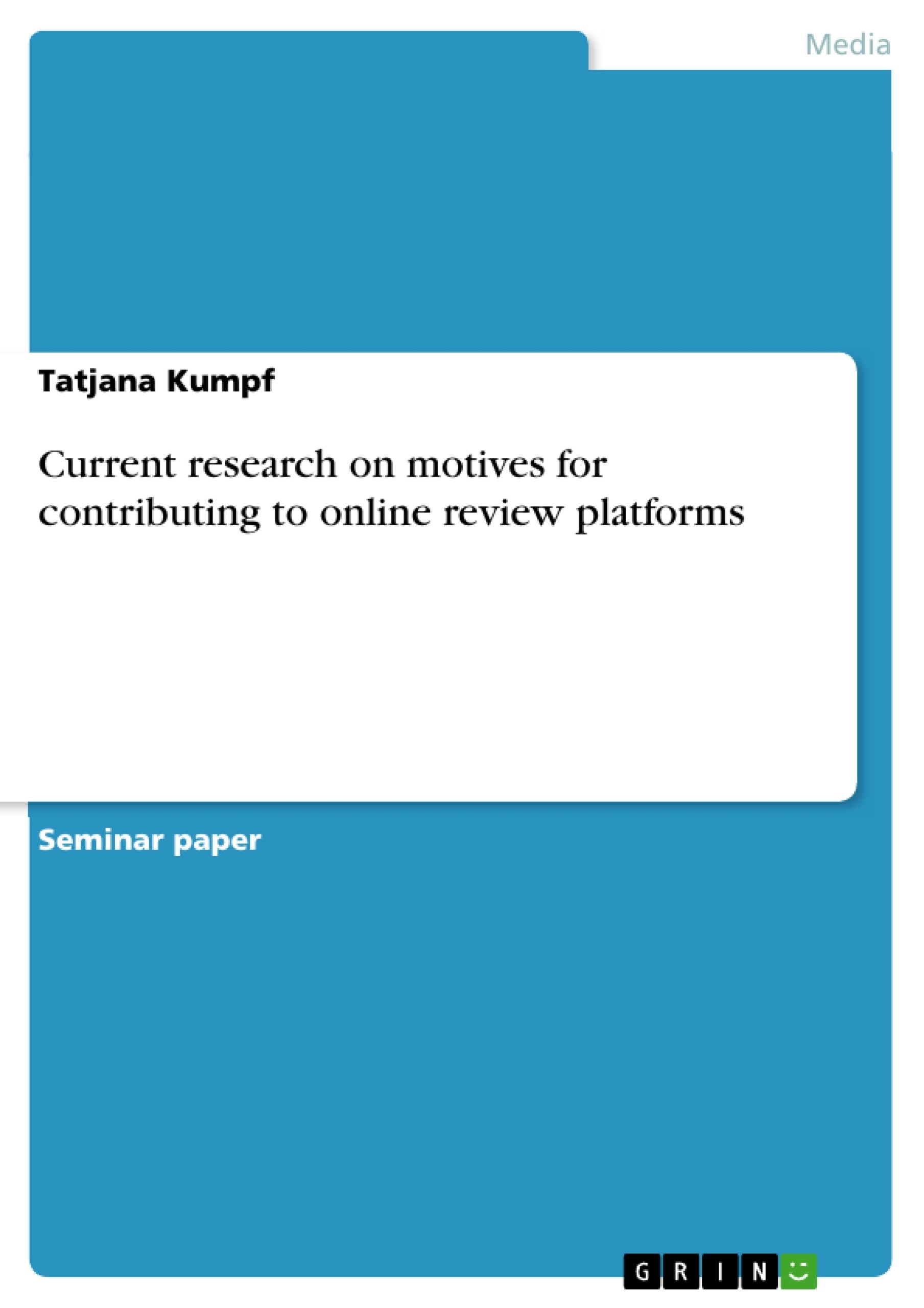The paper examines why people want to share information on the Internet and why they write online reviews. It will focus on the results of current research on the topic. Everybody is surrounded by decisions and is choosing one alternative out of a lot of possibilities all the time. But choosing is always connected with risk. This is why people search for further information about a product.
There are different ways to gather this information. Scientists found out that consumers use word-of-mouth (WOM) as one of the most important source to collect knowledge before buying. Moreover, consumers do not use WOM to merely gather information but also to share information and their opinions about products, services and brands.
Since the Internet is growing rapidly and thereby the amount of information available online is growing as well, electronic word-of-mouth (eWOM) is an interesting topic for recent research. Moreover, the growing global connection and the ability to access Internet at any time and at any place, leads to a high relevance of this topic. Consumers are able to communicate their opinions, feelings and thoughts about services and products anytime and at any place.
WOM is limited to a certain environment but eWOM has almost no limitations in its range. But not only the high range but also the anonymity is a great advantage of eWOM. Because of the growing spread of eWOM and the lack of research in this area, the available research will be discussed in the course of this paper to give an overview and identify limitations for further research.
Inhaltsverzeichnis (Table of Contents)
- Introduction
- (Electronic) word-of-mouth communication
- Hennig-Thurau et al.'s study
- Motives
- Positive and negative eWOM
- Criticism
- Motives
- Research
- Other studies
- Motives
- Criticism
- Conclusion
- Further Research
- Yelp!-Elite
- References
Zielsetzung und Themenschwerpunkte (Objectives and Key Themes)
This paper aims to examine the motives behind people contributing to online review platforms, offering a critical discussion of the current research in this area. It focuses specifically on understanding why people write reviews and analyzes the different factors that drive this behavior.
- Motives for contributing to online review platforms
- The nature of electronic word-of-mouth (eWOM) communication
- Critical evaluation of existing research on eWOM motives
- Identification of limitations in current eWOM research
- Suggestions for further research in the field of eWOM
Zusammenfassung der Kapitel (Chapter Summaries)
- Introduction: This chapter introduces the concept of electronic word-of-mouth (eWOM) and its significance in today's digital world. It highlights the importance of consumer reviews and the growing need for research in this area.
- (Electronic) word-of-mouth communication: This chapter defines the terms WOM and eWOM, outlining their key characteristics and differences. It emphasizes the non-commercial nature of WOM and discusses the various online platforms where eWOM takes place, particularly focusing on web-based consumer-opinion platforms.
- Hennig-Thurau et al.'s study: This chapter delves into the influential study by Hennig-Thurau, Gwinner, Walsh, and Gremler (2004), outlining their research on motives for eWOM communication. It categorizes these motives into those leading to positive and negative eWOM, providing an in-depth analysis of their findings.
- Other studies: This chapter examines other studies in the field of eWOM motives, comparing and contrasting their findings with those of Hennig-Thurau et al. It presents a critical analysis of the various approaches and limitations of these studies.
Schlüsselwörter (Keywords)
This paper explores key concepts related to online reviews and electronic word-of-mouth (eWOM) communication. It delves into motives for contributing to online review platforms, including those related to product involvement, self-involvement, message-involvement, and other-involvement. It also examines the critical role of eWOM in shaping consumer behavior and the impact of online reviews on purchase decisions. Further research focuses on identifying limitations in current studies and proposing new directions for exploring eWOM dynamics.
Frequently Asked Questions
Why do people write online reviews?
Motives include product involvement, self-enhancement, concern for other consumers, and the desire to help a company or seek social benefits.
What is electronic Word-of-Mouth (eWOM)?
eWOM is any statement made by potential, actual, or former customers about a product or company, which is made available to a multitude of people via the Internet.
What did Hennig-Thurau et al. find in their study on eWOM?
They identified several motive categories for why consumers share their opinions on platforms, distinguishing between factors leading to positive and negative reviews.
How does anonymity affect online reviews?
Anonymity is a major advantage of eWOM, as it allows consumers to express their feelings and thoughts more freely than in traditional face-to-face communication.
What is the Yelp!-Elite?
The Yelp!-Elite consists of highly active reviewers who are recognized for their quality contributions, often driven by social status and community belonging.
- Quote paper
- Tatjana Kumpf (Author), 2014, Current research on motives for contributing to online review platforms, Munich, GRIN Verlag, https://www.grin.com/document/379369



